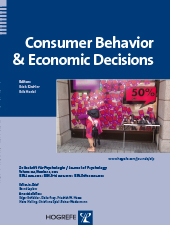Mortality Salience and Worldview Affirmation Strengthen Support for Foreign Products
Abstract
Research in terror management theory shows that, when reminded of their own death, people experience an elevated need to feel secure in their cultural worldview. This effect has consequences for consumer behavior. One unexplored possibility is that a worldview-affirming prime will buffer anxiety and actually increase willingness to purchase products representative of a foreign worldview after a death reminder. In our study, we first induced mortality or failure salience in 137 Austrian residents. Participants then read a diary entry about a holiday spent either in the mountains of Austria or in foreign countries. Finally, we measured willingness to pay a higher price for a local (“Fair Milk”) versus a foreign product (“fair trade”). Analyses showed that following mortality salience (compared to failure salience) the worldview-affirming prime (a diary entry about Austrian culture) uniquely increased willingness to pay higher prices for foreign products.
References
(1997). Suppression, accessibility of death-related thoughts, and cultural worldview defense: Exploring the psychodynamics of terror management. Journal of Personality and Social Psychology, 73, 5–18.
(2004). The urge to splurge: A terror management account of materialism and consumer behavior. Journal of Consumer Psychology, 14, 198–212.
(1973). The denial of death. New York, NY: Free Press.
(2008). Measuring consumers’ willingness to pay for organic and Fair Trade products. International Journal of Consumer Studies, 32, 479–490.
(2009). The role of personal values in fair trade consumption. Journal of Business Ethics, 84, 549–563.
(2010, May 1). Fakten zu Fairtrade Österreich
[Facts about Fair trade Austria] . Retrieved from http://www.fairtrade. at/?thema=fairtrade&zo=fairtrade_fakten. (2008). Rest in peace? Brand-induced mortality salience and consumer behavior. Journal of Business Research, 61, 1053–1061.
. (2008). Marketing research conducted on behalf of Fairtrade Labeling Organizations International. London, UK: Author.
(1990). Evidence for terror management theory II: The effects of mortality salience on reactions to those who threaten or bolster the cultural worldview. Journal of Personality and Social Psychology, 58, 308–318.
(1994). Role of consciousness and accessibility of death-related thoughts in mortality salience effects. Journal of Personality and Social Psychology, 67, 627–637.
(1995). Evidence of a terror management function of cultural icons: The effects of mortality salience on the inappropriate use of cherished cultural symbols. Personality and Social Psychology Bulletin, 21, 1221–1228.
(2008). A basic but uniquely human motivation: Terror management. In , Handbook of motivation science (pp. 114–134). New York, NY: Guilford Press.
(2006). Terror management and religion: Evidence that intrinsic religiousness mitigates worldview defense following mortality salience. Journal of Personality and Social Psychology, 91, 553–567.
(2005). Currencies as cultural symbols – an existential psychological perspective on reactions of Germans toward the Euro. Journal of Economic Psychology, 26, 129–146.
(2008). Focus theory of normative conduct and terror management theory: The interactive impact of mortality salience and norm salience on social judgment. Journal of Personality and Social Psychology, 95, 1239–1251.
(2002). The Scrooge effect: Evidence that mortality salience increases prosocial attitudes and behavior. Personality and Social Psychology Bulletin, 28, 1342–1353.
(1997). General and personal mortality salience and nationalistic bias. Personality and Social Psychology Bulletin, 23, 884–892.
(2008). The influence of information about organic production and Fair Trade on preferences for and perception of pineapple. Food Quality and Preference, 19, 114–121.
(2005). Self-affirmation and mortality salience: Affirming values reduces worldview defense and death-thought accessibility. Personality and Social Psychology Bulletin, 31, 658–667.
(1992). Are there universal aspects in the structure and content of human values? In , Advances in experimental social psychology (Vol. 25, pp. 1–65). Orlando, FL: Academic Press.
(1999). Belief formation in ethical consumer groups: An exploratory study. Marketing Intelligence and Planning, 17, 109–119.
(1988). The psychology of self-affirmation: Sustaining the integrity of the self. In , Advances in experimental social psychology (Vol. 21, pp. 261–302). New York, NY: Academic Press.
(2010). The divergence of implicit and explicit consumer evaluations. Zeitschrift für Psychologie / Journal of Psychology, 218, 28–35.
(1983). The impact of selected environmental forces upon consumers’ willingness to buy foreign products. Journal of the Academy of Marketing Science, 11, 71–84.
(1988). Development and validation of brief measures of positive and negative affect: The PANAS scales. Journal of Personality and Social Psychology, 54, 1063–1070.



